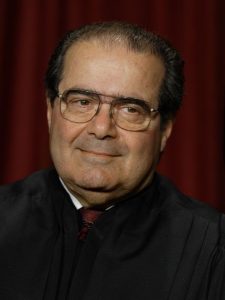(Akiit.com) “I don’t think there is anything to be gained by any Senator to vote against continuation of this act. And I am fairly confident it will be reenacted in perpetuity unless — unless a court can say it does not comport with the Constitution. “This was the late SCOTUS judge Antonin Scalia’s sharply and very pointed rejoinder during oral arguments before the high court back in February, 2013 on why the Voting Rights Act should be drastically watered down, gutted, or outright eliminated. Scalia got part of what he wanted when he and the other court conservatives by a 5 to 4 vote stripped away the pre-clearance provision of the Act. That required states to submit any changes in their voting procedures to the Justice Department for approval. The pre-clearance provision was there as a backstop that the feds could use to stop states from concocting all manner of schemes and dodges to dilute and suppress minority votes.
There’s little doubt that if Antonin Scalia had been on the bench when the North Carolina voter ID law hit the court, the vote would likely have been 5 to 4 to uphold the North Carolina law. Antonin  Scalia would not only have been the fifth vote but given his hard line quip that voting rights is a “racial entitlement” he would have been an eager fifth vote to keep the law on the books. The law put up all kinds of new restrictive requirements on the types of ID that could or couldn’t be used to prove voter eligibility. It was the most sweeping, rigid, and blatant effort to dump blacks and minorities from the polls. A lower court had struck down the law. Scalia’s absence got a 4 -4 tie vote which meant that the lower court decision stood.
Scalia would not only have been the fifth vote but given his hard line quip that voting rights is a “racial entitlement” he would have been an eager fifth vote to keep the law on the books. The law put up all kinds of new restrictive requirements on the types of ID that could or couldn’t be used to prove voter eligibility. It was the most sweeping, rigid, and blatant effort to dump blacks and minorities from the polls. A lower court had struck down the law. Scalia’s absence got a 4 -4 tie vote which meant that the lower court decision stood.
The significance of Antonin Scalia’s absence paid a dividend in two ways. The first is that by striking down the North Carolina voter suppression scheme, it will have a huge ripple effect in making it easier to topple laws in more than a dozen other GOP legislative controlled states that have erected varying types of voter suppression schemes. The other is the 4-4 tie vote divide between the court’s liberals and moderates and the conservatives will insure that other conservative schemes to gut, erode, or eliminate abortion rights, tighter gun control legislation, affirmative action, health care, education, and campaign reform legal challenges won’t get past first base with the court.
The Citizens United case that opened the floodgate on unlimited corporate bankrolling of campaigns was one case that might have been decided differently without Scalia’s vote to uphold it. The case that upheld the constitutionality of botched lethal injections in executions also might have been decided differently without Scalia’s vote to uphold the state’s right on the type of injections. The cases on contraception, prayer at city council meetings, and class action sex discrimination lawsuits against corporations also might have been decided differently without Scalia’s vote to water down contraception, uphold prayers, and toss sex discrimination lawsuits. Scalia’s reliable vote against any and everything that even remotely involved civil rights, civil liberties, voting rights protections, the death penalty and against any limits or restrictions on corporations was such a given that it could almost be mailed in.
Antonin Scalia’s impact on the high court went far beyond just votes on court cases. In his more than three decades on the bench, he maintained a hawk like watch to make sure that strict constructionism would hold sway in court decisions. He was, in fact, considered a demi-god among ultra-conservatives, pro-lifers and evangelicals. Scalia more often than not got his way because he was willing to cajole, hector, and even bully his way through during oral arguments in cases. He was an intimidating presence who could not be ignored. He was even more effective in getting his way because of the vast change in the way Supreme Court justices view their role on the court, namely as neutral and objective arbiters of the law.
In decades’ past, many Democratic and Republican-appointed justices scrapped party loyalties and based their legal decisions solely on the merit of the law, constitutional principles and the public good. Antonin Scalia, and Clarence Thomas though, were judicial horses of a different color. They were unabashed in their vow to uphold conservative tenets in all court cases and vote their ideology rather than the law. That’s why then GOP presidential candidate George Bush on the presidential campaign trail in 2000, when asked if elected what kind of judge he’d look for and nominate. He didn’t hesitate. He pledged to appoint “strict constructionists” to the court and specifically named Thomas, Scalia and William Rehnquist as the judges that perfectly fit that description. By then the three had already carved out a hard line niche as three of the most reflexive, knee-jerk, reactionary jurists to grace the court in decades.
Antonin Scalia made a mighty effort to shape and remake law and public policy in his narrow, retrograde image of what law and public policy in America should be. The Scalia dividend is that with his absence from the court that thankfully will change.
Columnist; Earl Ofari Hutchinson
Official website; http://twitter.com/earlhutchins









Leave a Reply